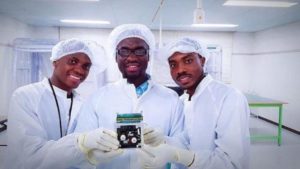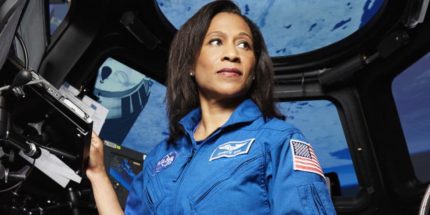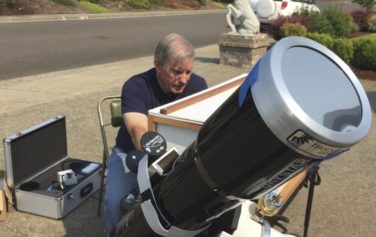
Ghanaian satellite team – Benjamin Bonsu, Ernest Teye Matey, and Joseph Quansah (Photo: All Nations University College)
African nations have entered the space race, with Ghana as the most recent example of this bold technological achievement. Built by a group of engineers from All Nations University College (ANUC) in Ghana — Benjamin Bonsu, Ernest Teye Matey, and Joseph Quansah — the small satellite was launched on a SpaceX rocket from Kennedy Space Center, and was sent to the International Space Station in June, becoming fully functional in July after being deployed from the ISS.
Known as GhanaSat-1, the satellite is a CubeSat, a miniature satellite and a class of nanosatellites used for research purposes. These satellites are manufactured in Units (or U), with each U measuring 10 centimeters by 10 centimeters by 11 centimeters (3.94 inches by 3.94 inches by 4.33 inches), and weighing less than three pounds (1.33 kilograms), according to NASA. CubeSats are built 1U, 2U, 3U or 6U in size, and serve as auxiliary payloads on previously planned missions.
GhanaSat weighs 2.2 pounds, generates power from solar cells and internal batteries, and contains low- and high-resolution cameras. The satellite also broadcasts Ghana’s national anthem and other songs from space.
“This particular satellite has two missions,” Richard Damoah, a Ghanaian professor and assistant research scientist at NASA, told TechCrunch. “It has cameras on board for detailed monitoring of the coastlines of Ghana. Then there’s an educational piece ― we want to use it to integrate satellite technology into high school curriculum.” GhanaSat-1 will also send signals to the Space Systems and Technology Laboratory at ANUC. Damoah noted that while Ghanaian president Nana Akufo-Addo congratulated the team, the government of Ghana did not officially sponsor the project. Rather, Japan Aerospace Exploration Agency (JAXA), Japan’s national space agency, provided most of the resources for the two-year, $500,000 project. President Akufo-Addo and his cabinet, according to the professor, have pledged support for a GhanaSat-2, which will have high resolution cameras and would monitor such activities as water use, deforestation and illegal mining in Ghana.
Ghana is not the only nation on the African continent taking the plunge and heading off to space. According to Elsie Kanza, Head of Africa at the World Economic Forum, “Several nations, such as South Africa, Nigeria, Kenya and Ethiopia have space agencies.”
South Africa launched its first satellite in 1999, a second in 2009, and established its national space agency, SANSA, in 2010. In 2013, South Africa sent its first CubeSat into orbit. Ethiopia launched the first space program in East Africa in 2015 with the building of a $3 million, privately funded observatory, the first step in creating an official national space agency. The second most populous African nation, facing poverty and hunger, is looking to science as the key to development. In Northern Africa, Algeria formed its space agency in 2002 and launched six satellites since that time, while Egypt launched its first satellite in 2007.
Nigeria has sent five satellites into space, with the most recent, NigeriaSat-X, built by Nigeria’s National Space Research and Development Agency (NASRDA). Professor Seidu Mohammed, Director General of NASRDA, announced Nigeria will need an international space station by 2030, as Pulse reported. Last year, the Nigerian Space Agency sent a delegation to China to discuss the logistics and investment for Africa’s first manned space mission. In May, the government of Angola announced that its first satellite — Angosat1 — will be launched this year. The project is receiving support from the Russian space federation.
There are collective efforts toward an African outer space policy as well. The African Union (AU) has embarked on a plan for Pan-African collaboration in space. Last year in Addis Ababa, the AU adopted the African Space Policy and Strategy Initiative, “as the first of the concrete steps to realize an African Outer space Programme, as one of the flagship programmes of the AU Agenda 2063,” the AU said in a statement. AU Agenda 2063 is a strategic plan for the socioeconomic transformation of the continent over the next half century, with a focus on growth and sustainable development and a vision of an “integrated, prosperous and peaceful” continent that is a dynamic force on the world stage. The international body has urged its member states, partners and commission “to raise awareness on the central role of space science and technology in Africa’s socio-economic development and mobilize domestic resources for the implementation of this policy and strategy.”
The African Union Commission, which acts as the executive and secretariat branch of the 54-member organization, has made it a priority to coordinate all space activities among the AU countries, and to gradually move Africa from a consumer of space technology to a world leader in the development of technology. AU members are committed to using space and its technologies for peaceful means, and seek involvement in developing a space code of conduct, given the increased congestion in space due to the over 60 countries operating Earth-orbit satellites. The European Union has drafted such a proposal for a code of conduct, and the AU says it has been marginalized and, at best, a minor player in the process of devising this policy.
Raising the necessary capital for any space program, African or otherwise, is crucial. This reality was underscored in 2013, when Great Britain announced it was providing £1.5 billion (US$1.94 billion) in aid to African and Asian nations with rocket and satellite programs. Godfrey Bloom, a member of the European Parliament from the nativist UK Independence Party, criticized the amount of foreign aid given to “Bongo Bongo Land,” claiming his remarks were not racist because bongo is a term for antelope. While funding, poverty and huge disparities among member nations remain a challenge for Africa’s space aspirations, working in its favor are high rates of economic growth, high population growth and a vibrant, growing youth population. Ghana, for example, has a population whose media age is 30. The country enjoys cultural and ethnic diversity, a boom in tourism, and a better educated population that learns the Ghanaian language alongside the official language English, French and other languages. African cities such as Nairobi, Lagos and Cape Town are regarded as “vibrant innovation hotspots” in technology, driven by entrepreneurial startups and universities.
Other nations of the world have utilized space technology as a means of scientific advancement and socio-economic progress. Ghana and other nations of the African Union and are no exception, as they become players in the global space race, and seek leadership status in the frontiers beyond Earth. African nations are ensuring they will not be left behind in the field of space exploration, and hoping to maximize the benefits of this technology to solidify their economic future.

